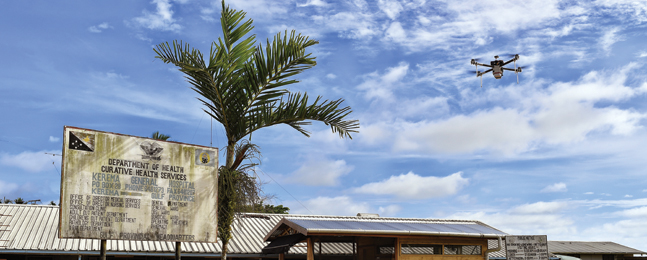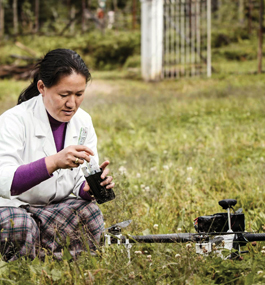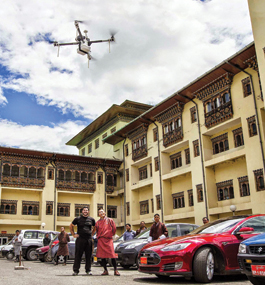Up and Coming
Dimitar Pachov, PhD’11, designs networks of peaceable drones, to bring life-giving aid to the developing world.

Matternet
FAST ACTION: In Papua New Guinea last fall, Matternet tested whether its drones could help quell a stubborn TB epidemic there. UAVs can quickly ferry test results to public-health officials working on containment.
by Leah Burrows
Last summer, Google released a two-minute video of an unmanned aerial vehicle (UAV) flying dog treats to a farmer in Australia.
The glossily produced clip, set to the song “Spirit in the Sky,” announced Google’s entry into the drone-delivery marketplace, part of an increasingly crowded UAV airspace already occupied by Amazon and Facebook. All three companies will spend millions of dollars developing fast, efficient commercial drones — and, likely, millions more lobbying the Federal Aviation Administration (FAA), which still hasn’t said it will allow drones to deliver consumer goods within the United States.
As the Google crew filmed the doggie treats soaring over Queensland, a small technology startup in Silicon Valley was hard at work developing drones that will deliver something a touch more important: hope.
In August 2014, a company called Matternet launched a UAV pilot program connecting three remote Bhutanese health-care clinics, high in the Himalayas, with Bhutan’s largest hospital. Test results and medical supplies that used to take days to get from one place to the other now take only a matter of hours.
Matternet plans to build networks of UAVs to service many of the world’s poorest regions, where roads are often unusable for months at a time, blocking access to markets or medical treatment.
“Cutting-edge technology has always been applied first in the developed world, in places that already have resources and infrastructure,” says Dimitar Pachov, PhD’11, a Matternet co-founder. “Take cellphones. The cellular network was introduced to the world in regions where landlines were ubiquitous and well maintained.”
Pachov is a physicist, someone who sees a world where technology often bypasses the poor as a world out of equilibrium.
So he’s using drones to flip the old paradigm. “Logically,” he says, “shouldn’t the places that need the technology the most get it first?”
Tearing down walls
Pachov knows firsthand about worlds out of balance. He grew up in Bulgaria, a member of the “transition generation” that came of age after the fall of the Berlin Wall, as Bulgaria moved from communism to democracy, at least in theory.
“The years after the fall of the wall were some of the hardest in Bulgaria,” Pachov recalls. “We were told we were becoming more democratic, but the transition was very painful and life didn’t change for a lot of people. In fact, it became worse.”
In the winter of 1996, an economic crisis hit the country hard. Pachov’s family earned less than $50 a month. Still, he managed to work his way through his undergraduate studies at Sofia University. He founded the university’s first faculty-student council and represented the student body to the university administration. He was eager to make a difference, to speak out.
“I saw too many things in Bulgaria that made people unhappy,” Pachov recalls. “I saw good people living bad lives and bad people living good lives. I knew there must be fairness in the world. There must be social justice.”

Matternet
TESTING IN BHUTAN: Drones can fly just 20 miles before their batteries have to be recharged or replaced. Networks of charging stations will be built to keep them on the move.
page 2 of 3
Although Pachov came to Brandeis to pursue a PhD in physics, he soon fell in love with biophysics and biochemistry. Working under biochemistry professor Dorothee Kern, he studied computational biophysics, exploring molecular conformational pathways of proteins within cells.
For six years, most of Pachov’s world fit under a microscope. After completing his dissertation, he knew he needed to expand.
By chance, he learned about Singularity University (SU), an education center and startup accelerator in Silicon Valley that encourages the creation of high-tech solutions for pressing problems in the world. SU was challenging researchers and entrepreneurs to come up with an idea that could improve the lives of 1 billion people in 10 years. Pachov applied and was admitted into the three-month SU summer program.
No-fly zones
At SU, Pachov joined up with Andreas Raptopoulos, an innovator and entrepreneur with a passion for things that fly, who wanted to create transportation technology that could alleviate poverty.
Pachov, Raptopoulos and an initial team of four other people focused on finding ways to help communities in Africa and Asia that were cut off from the world for six months at a time during rainy seasons or winters, when the few roads become impassable.
To bring goods across land riddled with obstacles, you have to look up — over the river, over the snow. So, within the first week, the Raptopoulos team started researching drones, and the nucleus of what would become Matternet was formed.
The engineers built drone prototypes, and Pachov researched UAV regulations around the world. “It was obvious the U.S. was not the place to test these vehicles,” he says. “The FAA is just too restrictive and too slow-moving to enact any change.”
Under FAA rules, commercial operators can’t fly drones without the agency’s permission. And, even with permission, companies can’t test drones outdoors until the agency has drawn up UAV safety rules, which may or may not be finalized in 2015.
Unlike the U.S., few countries in the developing world have any UAV restrictions at all. Developing countries present other challenges, however.
First, there are the cultural hurdles. In many parts of the world, the word “drone” is synonymous with death and destruction, Pachov says. Getting people in war-torn countries to trust machines in the sky is one of Matternet’s major challenges. The company has to educate local populations on what UAVs do and how they do it.
Then there are the security concerns, says Pachov. Will the medical supplies reach their destination, or will the drones become targets for ransom or resale?
But all these challenges pale in comparison to the issue before Matternet right now — figuring out how to design and build an autonomous drone network.
The right algorithm
Autonomous drones aren’t controlled by a human. There is no remote, no person sitting in front of a computer telling them where to go. They fly on their own, using their own sensors and a very, very complex algorithm based on artificial intelligence.
What happens if the distance a drone needs to travel is longer than the life of the battery powering it? This is where the “net” in Matternet comes in. The company plans to build networks of a variety of stations where vehicles can recharge, swap batteries or drop off packages.
Say a medical clinic in the Congolese city of Uvira needs to send malaria medication 200 miles south to a small village on Lake Tanganyika. A Matternet drone can travel just 20 miles before it has to recharge or replace its battery, so there would be a number of charging stations between Uvira and the village. Before taking off, or even during flight, the drone would use its algorithm to map out the best route with its GPS, stopping at the most-optimal places.

Matternet
HIGH IN THE HIMALAYAS: With drones creating a lifeline, Bhutan's remote mountain communities could have unprecedented access to health-care services.
page 3 of 3
But energy is not the only variable the drone algorithm would have to take into account. The terrain between the city and the village is mountainous. Maybe a bad storm is moving in from the east, bringing high winds and rain. Maybe fighting between Congolese and rebel forces has been reported outside the village. For the network to be successful, any algorithm Matternet writes has to take all these conditions, and more, into account.
Although it’s a daunting challenge, Pachov, a network adviser helping to develop the drone algorithm, is optimistic.
“You see the same thing in physics all the time,” he says. “You have a long list of variables describing a state or a process, and the first step is to figure out what you can make constant. Once those constants are established, you can focus on finding the best pathways from point A to point B given the variables — like the weather or the time of day.”
To establish constants, Pachov applies what he knows about networks of molecular transitions to the world of drones. In cells, molecules operate autonomously along a series of signaling pathways to perform specific functions. Their operation is governed by conditions. For instance, as a Brandeis student Pachov would change the number of sodium atoms closely surrounding a molecule to see if that had an effect on its activity.
“The principles of math and physics don’t change much between the micro and macro world,” Pachov says. “For the most part, a network of biomolecules and a network of drones operate under very similar principles.”
Matternet isn’t Pachov’s full-time project. He’s a postdoctoral fellow in Stanford University’s chemistry department, focusing most of his attention on developing novel robotics-inspired computational algorithms. He hasn’t gone to the UAV field tests in Bhutan, or the ones in Haiti or the Dominican Republic before that. He cheers on the little drones from afar.
Three years in, the company founded on the promise that it would help 1 billion people in 10 years is well on its way, thanks to successful field trials in Bhutan and elsewhere. Meeting the ambitious goal won’t be easy, Pachov says, but nothing worthwhile ever is.
He says he’s proud to have been at Matternet from the beginning, putting in long, exhausting hours, staring at whiteboards with scribbles jumbled together like a crossword puzzle with no lines.
“We always knew we were working on something new, something revolutionary,” Pachov says.
When the first cars were introduced, he says, people were leery of them, too. Some of the cars didn’t have headlights, so laws required that, at night, someone had to walk in front of them, carrying a light to illuminate the path and warn pedestrians that something speedier than a horse and buggy was coming.
“Sometimes I think we are those men, carrying the light and showing the way,” Pachov says. “Of course there are many obstacles, many people to convince, but if we show people the benefits of this technology, maybe there can be more equality in the world.”
